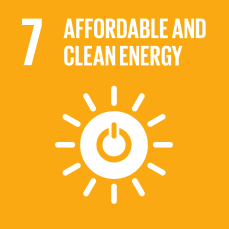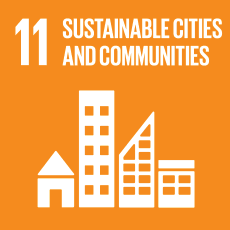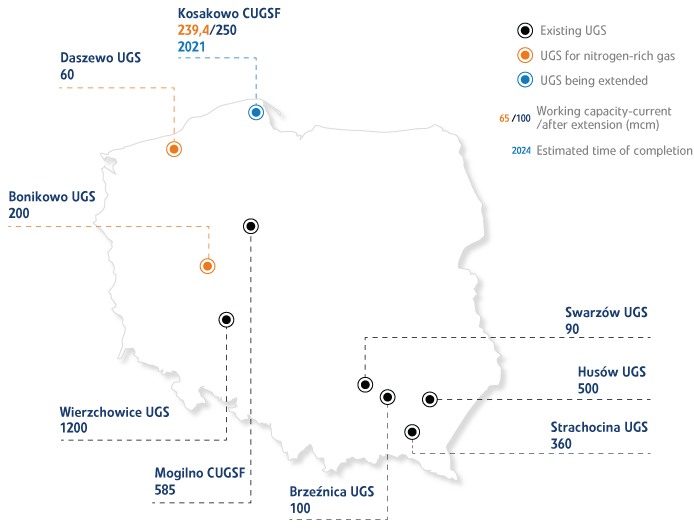


As part of its business, PGNiG holds a licence to trade in gas fuels, trade in natural gas abroad, generate electricity, trade in electricity, liquefy natural gas, and regasify liquefied natural gas at LGN regasification plants.
In 2019, PGNiG purchased natural gas mainly under the long-term agreements and contracts specified below:
PGNiG also received gas under medium- and short-term contracts for grid deliveries and LNG supply (e.g. the five-year contract which entered into force in 2019 for nine liquefied natural gas shipments from Centrica LNG Company Limited).
Imports of natural gas to Poland in 2015–2019 (bcm)
In 2019, the imported gas volume was 162.9 Twh (14.9bcm). Gas purchases from countries east of Poland fell by 1.0TWh (approximately 0.1 bcm) compared with 2018. LNG deliveries increased significantly, from 29.8 Twh (2.7bcm) in 2018, to 37.6TWh (3.4 bcm) in 2019.
In 2019, PGNiG took further steps to diversify its gas supply sources and build the gas portfolio. On September 12th 2019, PGNiG executed an annex to the long-term contract for the supply of LNG with Venture Global Plaquemines LNG, LLC, dated September 28th 2018.Under the annex, the volume of LNG deliveries to PGNiG from the planned Plaquemines LNG liquefaction terminal in Plaquemines Parish, the US, was increased from 1m tonne to 2.5m tonnes annually, which corresponds to a total volume of nearly 3.4 bcm of natural gas after regasification. Following execution of the Annex, the total volume of LNG deliveries from Venture Global Plaquemines LNG, LLC and Venture Global Calcasieu Pass, LLC to PGNiG in 2023–2043 may reach 3.5m tonnes of LNG per year, i.e. over 4.7 bcm of natural gas after regasification per year. The deliveries will be made on a free-on-board basis.
PGNiG actively supports all efforts aimed at the construction of an infrastructural connection that would give Poland direct access to gas from North Sea fields. In January 2018, a contract was concluded for the provision of gas transmission services in the period from October 1st 2022 to September 30th 2037, as part of the 2017 Open Season procedure of the Baltic Pipe project, concerning gas transmission from Norway to Poland via Denmark. Conclusion of transmission contracts with transmission system operators, i.e. GAZ-SYSTEM and Energinet, with a total value of PLN 8.1bn, was the last stage of the Open Season 2017 procedure.
In 2019, PGNiG continued its efforts to change the price terms under the Yamal contract, formally commenced on November 1st 2014. On June 29th 2018, the Arbitration Institute issued a partial award in the arbitration proceeding instigated by PGNiG against OOO Gazprom Export. In the partial award, issued on an ad hoc basis, the Arbitration Institute:
In accordance with the provisions of the Yamal contract, the new contract price determined by the Arbitration Institute should apply with retroactive effect as of November 1st 2014.
On November 1st 2017 and December 7th 2017, PGNiG and OOO Gazprom Export, respectively, submitted further requests for renegotiation of the price terms.
On November 15th 2019, PGNiG served a notice upon PAO Gazprom and OOO Gazprom Export to terminate the Yamal contract with effect from December 31st 2022 . On December 12th 2019, the Company announced that the Arbitration Institute closed the evidence-hearing procedure and expects to issue the final judgment in February or March 2020.
In 2019, PGNiG received a total of 31 LNG shipments to Poland, with a total volume of 2.46m tonnes, which is ca. 37.58 TWh or 3.43 bcm of natural gas after regasification, including:
Customers buy gas from PGNiG at market prices, in line with the formulas and pricing mechanisms set out in the contracts. The prices in contracts executed by PGNiG are established on a case-by-case basis using a uniform, objective pricing methodology. Settlements with customers are based on pricing formulas or fixed prices linked to exchange indices.
In 2019, PGNiG successfully continued its sales strategy as a result of which it succeeded in retaining its customer base. The largest amounts of natural gas are sold in Poland to industrial customers. Major customers purchasing natural gas include: PKN Orlen S.A., Polska Grupa Energetyczna S.A., KGHM Polska Miedź S.A., ArcelorMittal Group, Grupa LOTOS S.A., and Grupa Azoty S.A.
In June 2019, Grupa Azoty S.A. served a notice extending the term of gas supply contracts executed on June 21st 2017 until September 30th 2022. The total value of the four-year contracts, i.e. covering the delivery period from October 1st 2018 to the end of September 2022, is estimated to exceed PLN 8bn.
In 2019, PGNiG’s sales of high-methane grid gas in Poland amounted to 175 TWh (ca. 16 bcm). The sales volume fell year on year by 1.7%, from 172 TWh (15.7 bcm) in 2018.
In 2018, PST opened a branch in Poland with a view to establishing relations with customers purchasing energy in Poland and other European countries by building on existing contacts with branches of international companies.
In 2019, a separate customer portfolio was transferred from PGNiG to PST (the last contract was transferred in January 2020). During the year, PST acquired three new customers. The company became a member of the Polish Power Exchange (PPX) and opened a trading office in Warsaw.
In 2019, PGNiG continued to sell natural gas to the Ukrainian market, in cooperation with the ERU Group of Ukraine. Its 2019, the sales to Ukraine totalled 544 mcm (5.97 TWh).
PGNiG executed contracts with Ukrainian operators of gas transmission pipelines and gas storage facilities (Transmission System Operator of Ukraine LLC and JSC Ukrtransgaz). The Company monitors growth opportunities on the Ukrainian market.
The volume of gas sold by PGNiG on the PPX in 2019 (sales with delivery dates in 2019) increased year on year by approximately 4.7 Twh to 97.8 TWh (8.91 bcm).
In 2019, PGNiG developed its operations in the small-scale LNG business segment, where gas is sold in the form of LNG transported by road tankers to regasification facilities or stations with no access to the distribution network. The volume of fuel delivered to end users in the form of liquefied natural gas is growing steadily. 2,306 road tankers were loaded with LNG in Świnoujście in 2019, compared with 1,794 in 2018, and 1,523 in 2017. In 2019, the aggregate amount of LNG the Company placed on the market was 59.2 thousand tonnes, of which 39.9 thousand tonnes was sourced through Świnoujście and 20.1 thousand tonnes from Odolanów and Grodzisk Wielkopolski. The aggregate amount of LNG the Company placed on the market in 2016–2019 was 195.5 thousand tonnes, of which 107.7 thousand tonnes was sourced through Świnoujście, while 87.8 thousand tonnes from Odolanów and Grodzisk Wielkopolski.
On the electricity market, PGNiG is engaged primarily in wholesale trading. Total sales of electricity to trading companies and on the Polish Power Exchange accounted for more than 90% of its total electricity sales in 2019.
PGNiG also provided services under a commercial balancing agreement to PGNiG OD and the PGNiG TERMIKA Group.
Following auctions organised by Polskie Sieci Energetyczne in 2018 and 2019 (related to the implementation of the capacity market and the capacity obligation), PGNiG concluded the following agreements:
PST is an active player on organised markets (exchanges) and in OTC trading. It trades with over 100 counterparties under EFET (master agreements for trading in gas and electricity) or similar standardised contracts. In order to conduct trading activities on the global LNG market, the company has established a branch in London. For more information on the London Office project.
PST operates in Germany and in neighbouring countries: Austria, the Czech Republic, the Netherlands, on the UK gas market (NBP), and has reached operational readiness in France and Poland. PST is also registered as a forwarding operator in Denmark, Slovakia and, since 2018, in Hungary. PST is a market maker on the PEGAS exchange for the GASPOOL gas hub market area.
PST continues operations in the area of trading in futures contracts for Brent crude on the ICE Futures Europe exchange and securing LNG supplies through the ICE Futures U.S. exchange. It also sells electricity on the German market in exchange (EEX) and OTC transactions.
Sales of PST, including its subsidiaries, by product (in volume terms)
Sales of PST, including its subsidiaries, by country (in volume terms)
In 2019, PST sold 84.2 TWh of gas delivered by pipelines, 10.4 TWh of LNG, and 5.5 TWh of electricity, in exchange and OTC transactions. Poland is PST’s largest market, accounting for 40% of its sales volumes, while the Dutch and German markets account for 32% and 27%, respectively.
PST’s key contracts effective in 2019 included a contract for the provision of the ticketing service involving maintenance of mandatory gas stocks in Poland of 576 GWh (with PGNiG) and contracts for the management of Austrian gas storage capacities (a working volume of 17 GWh).
On August 1st 2014, PGNiG OD was spun off from PGNiG to conduct retail sale of natural gas and provide retail customer services. PGNiG OD focuses on the sale of natural gas (purchased mainly on the PPX), electricity, compressed natural gas (CNG), and liquefied natural gas (LNG). As part of its business, PGNiG OD holds a licence to trade in gas fuels and in electricity.
High-methane gas is procured from three main sources:
The largest share in the volume of high-methane gas purchases is attributable to transactions on the PPX. Apart from natural gas, PGNiG’s purchase portfolio also includes high-methane and nitrogen-rich gas, and liquefied natural gas (LNG). Nitrogen-rich gas and LNG are purchased under bilateral contracts with PGNiG.
PGNiG OD’s customer base includes consumers and non-consumers (small and medium enterprises). Customers are classified into tariff groups based on the following criteria:
Group 1-4 retail customers purchase gas used mainly for cooking and for water and space heating, as well as in shop-floor processes. Natural gas for households is billed based on a tariff valid until January 1st 2024. In 2019, PGNiG OD applied the following gas fuel trading tariffs:
In December 2019, the President of URE approved Tariff No. 8 to be effective from January 1st 2020 to June 30th 2020, which reduced gas fuel prices by 2.9%.
In 2019, PGNiG OD acquired approximately 163,000 new retail accounts in tariff groups 1–4 (both high-methane and nitrogen-rich gas). Business customers buy gas both for the purposes of their industrial processes and for heating, and are billed at prices set in the business tariff and in special offers.
PGNiG OD offers a range of LNG and CNG products and services addressed to end users. The company’s offer includes:
As regards LNG, PGNiG OD focuses on industrial customers, while customers in the CNG segment are mainly municipal transport companies. Other CNG customers include commercial vehicles and retail customers. In 2019, 29 LNG fuel sale contracts were executed, including contracts with Synthos Dwory 7 Sp. z o.o., Miejskie Zakłady Autobusowe Sp. z o.o. of Warsaw, LOTOS Asfalt Sp. z o.o. - for the supply of LNG to a fleet of vessels.
In the case of the CNG fuel, 76 sale contracts were concluded, and the volumes sold at CNG stations in 2019 reached 20.6m Nm3. The largest contract for the sale of CNG in 2019 was signed with Arriva for a period of eight years.
In 2019, PGNiG OD acted as an ‘emergency supplier’ (in connection with the Regulation of the Minister of Energy of September 21st 2018 Amending the Regulation on Specific Conditions for the Operation of the Gas System), as well as ‘stand-by supplier’ and ‘last resort supplier’ (in connection with the Act Amending the Energy Law and Certain Other Acts of November 9th 2018). In 2019, following discontinuation of gas fuel supplies by energy companies, including Energy Match Sp. z o.o., Hermes Energy Group S.A. and Orange Energia, PGNiG OD ensured undisrupted supply of gas fuel to their customers. Customers taken over from other suppliers are billed at prices set in the retail tariff of PGNiG OD (consumers) or the ‘Gas for Business’ tariff (non-consumers), as applicable.
PGNiG OD’s customer base includes consumers and non-consumers who have concluded comprehensive service contracts for the supply of electricity or contracts for the sale of electricity. As at the end of 2019, PGNiG OD had approximately 89,000 customers on dual fuel (electricity and gas) plans, including 89% consumer accounts and 11% non-consumer accounts.
In 2015, PST spun off its retail operations, which have since been carried out through its subsidiary, PST ES, selling gas and electricity to end users in Germany and Austria. Target customers include small and medium-sized enterprises (SMEs) and households with standard consumption profiles.
The number of customers decreased to 39 thousand as at December 31st 2019 from 43 thousand as at the end of the previous year. In 2019, PST ES executed 26.3 thousand new contracts, with deliveries scheduled to begin in 2019 and the following years confirmed under 45% of them.
The segment uses the working capacities of the Wierzchowice, Husów, Strachocina, Swarzów and Brzeźnica underground gas storage facilities, as well as the Mogilno and Kosakowo underground cavern facilities for its own needs. A part of the working capacity of the Mogilno facility which was made available on a TPA basis to GAZ-SYSTEM is not a storage facility within the meaning of the Polish Energy Law. The capacities of gas storage facilities are managed by GSP, conducting activities in the following two core areas:
Underground gas storage facilities

Source: In-house analysis based on data from the Geology and Hydrocarbon Production Branch.
As part of its business, GSP holds a licence to store gas fuel in storage facilities. Settlements of gas fuel storage services with storage service customers are based on the following tariffs:
Under an outsourcing agreement, GSP provides storage services at underground high-methane gas storage facilities owned by PGNiG.
Short-term peak fluctuations in demand for natural gas are balanced by supplies from the Mogilno and Kosakowo facilities, where gas is stored in worked-out salt caverns. The capacities of the Wierzchowice, Husów, Strachocina, Swarzów and Brzeźnica UGSFs are used to balance out changes in demand for natural gas in the summer and winter seasons, to meet the obligations under take-or-pay import contracts, to ensure the continuity and security of natural gas supplies, and to meet the obligations under gas supply contracts with customers.
GSP, in its capacity of the storage system operator, provides gas fuel storage services to storage facility users under standardised procedures, on a non-discriminatory, equal-treatment basis, so as to ensure the most efficient use of the storage capacities. Storage services are provided under standard storage service agreements (SSSA).
As at December 31st 2019, under SSSA, GSP provided a total of 166.8 thousand long-term storage capacity packages, including 68.9 thousand packages of storage services provided on a firm basis, and 97.8 thousand packages on an interruptible basis. As part of short-term storage services on an interruptible basis as at December 31st 2019, GSP allocated up to 931 storage capacity packages/flexible packages.
As at December 31st 2019, GSP had a total working storage capacity of 3,074.8 mcm, of which a total of 3,039.59 mcm was made available, on a TPA (third-party access) basis and to GAZ-SYSTEM, as part of long-term services ca. 23 mcm, out of ca. 30 mcm, of working capacity was made available as part of short-term services, on an interruptible basis, due to technical conditions. In addition, GSP allocated ca. 5 mcm of working capacity for the needs of the Mogilno CUGSF’s and Kosakowo CUGSF’s technological units.
| Total working storage capacities and TPA working storage capacities | ||||||
|
Working storage capacities (mcm)
|
TPA working storage capacities (mcm)
|
TPA working storage capacities (GWh)
|
|||
|
2019
|
2018
|
2019
|
2018
|
2019
|
2018
|
|
Kawerna Storage Facilities Group
|
825
|
825
|
813
|
813
|
8,915
|
8,915
|
|
Wierzchowice SF
|
1,200
|
1,200
|
1,200
|
1,200
|
13,166
|
13,166
|
|
Sanok Storage Facilities Group
|
1,050
|
1,050
|
1,050
|
1,050
|
11,521
|
11,521
|
|
Total
|
3,075
|
3,075
|
3,063
|
3,063
|
33,602
|
33,602
|
| * Converted to gas with a calorific value of 39.5 MJ/m3. | ||||||
PGNiG offers a ticketing service which allows gas importers and traders to meet their gas-stocking obligations in accordance with the applicable Polish regulations. The Company performs ticketing service contracts concluded for the gas year 2019/2020 with six energy companies. The total volume of natural gas stocks maintained by PGNiG for third-party customers exceeds 370 GWh.
As part of the ticketing service, PGNiG maintains gas stocks in gas storage facilities operated by GSP.